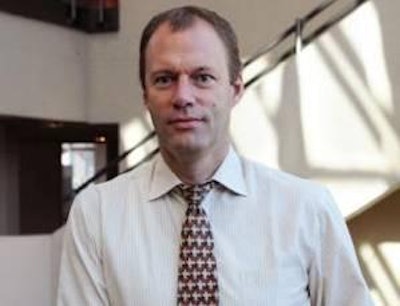
Despite the change in ownership, it’s business as usual at animal health company Merial, says its head of global avian business, Alain Wille.
No company works in isolation, however, and while the sanofi-aventis purchase of the business that it jointly owned with Merck may have had little impact on its day-to-day running, the market in which the company operates is far from static.
Poultry production around the world is changing, and while the key focus for the company’s poultry division has traditionally been the US, the Chinese market has now taken over lead position, with the US coming in second, followed by Brazil.
All in the numbers
This change has not come about simply as a result of growing interest in poultry health in China, it is the result of growing bird placements as the number and size of flocks increases there in response to growing income levels.
Reflecting on the rising importance of China to the company, Mr Wille says: “People now have more money, whereas previously they sourced their protein from vegetables, now it is through meat, and that meat is increasingly chicken.”
Additionally, while Chinese expansion means its importance as a centre of production is growing, falling output in other countries is diminishing their importance. Bird health still has to be addressed, but the last year or so has seen a fall in placement numbers in some key markets.
Mr Wille continues: “This fall in placings has primarily been in the US, but we are seeing it also in Brazil. Fortunately, however, we have the expectation that placements will go up again over the next 12 months.”
Investment
Testament to how the Chinese market is growing is Merial’s investment in a new local production plant. Its current vaccine production site can no longer keep up with demand, but extending these facilities was not an option as urbanization had grown up around them.
Instead, the company is investing over $70 million in the Nanchang Hi-tech Development Zone. The new facility, covering an area of 50,000 square meters, will see the company’s vaccine production capacity in the country double.
But why invest in China when Merial already has a number of manufacturing sites around the world? For Mr Wille, there is benefit lies in being close to, and understanding, the market.
Anything is possible
“There are 20 rules for doing business in China, and the first is that anything is possible. The second is that nothing is easy,” he says.
For this reason, Merial has a Chinese team in place that understands the market and the local way of doing business. Local production not only gives easier market access, but also makes it easier to manipulate virus strains that would be considered exotic elsewhere. Furthermore, the company has a number of agreements in place with local universities, and this can lead to the utilization of new virus strains.
While the phrase “think globally, act locally” is often used, Mr Wille believes that it is the only way for a supplier to properly respond to each market, and makes a comparison between China and Thailand.
“There is a big difference in market conditions between the two countries. In China, poultry production is primarily to serve the local market, whereas in Thailand there was already a focus on exports, with Europe, in particular, being a target.”
And for those market watchers, the view from Merial is that, while Thailand may have had its difficulties, this is another market that is beginning to pick up.
New directions
Working closely with customers is not the only way in which the company is trying to respond to producers’ needs. Earlier this year, it entered an agreement with AviTech for worldwide distribution of its in-ovo technology. The technology is not tied to Merial’s vaccines, yet Mr Wille has a strong belief in AviTech’s work.
“AviTech is an engineering company and its product is state of the art,” he says. “They looked at in-ovo technology, at all its phases, and considered each one with fresh eyes, making it easier to use and less subject to wear and tear.
With Australian company Imugene, the company is examining a number of vaccine candidates.
Do you still need me?
But with increased biosecurity and better understanding of nutrition and welfare, is there still such a strong need for animal health companies?
“Even with improved biosecurity, birds still need vaccination,” Mr Wille argues. “There is now less need for antibiotics, for example, but even if biosecurity is good, vaccination offers an extra security. Over the last 20 years, the approach has gone from treatment to prevention, so there is still a need for vaccines.”
Consumer concerns over some animal health products have meant, and continue to mean, that producers must review the inputs that they select and animal health companies need to align their portfolios to industry’s changing needs.
Traditional coccidiastats, for example, interfere with feeding regimes making them less than optimal. Merial has entered the market for anticoccidial vaccines with Hatchpak Cocci III, and Mr Wille believes that there could come a time when some consumers start to view coccidiostats with the mistrust that some now have for in-feed antibiotics.
Key focus
Since the introduction of its fipronil-based flea and tick product Frontline in the 1990s, Merial has become known largely as a companion animal business. The poultry division now accounts for only 12 percent of the company’s total turnover. In an era of increasing specialization, why does Merial maintain a presence in poultry?
On this point, Mr Wille is quite clear:
“Merial, as a business, is heavily weighted by Frontline, so if you disregard that product, the avian division becomes much more important.
“We want to be in all business sectors and, when you look historically, we’ve had a strong position in poultry. The market for protein is driven by poultry, more than by pork, it is a sector with positive trends. Poultry was identified many years ago as a strategic business, and this has not changed for us.”




.jpg?auto=format%2Ccompress&fit=crop&h=167&q=70&w=250)













